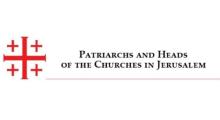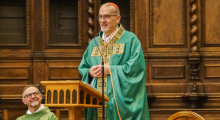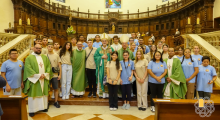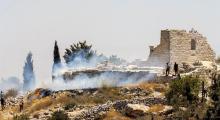Issued by the Catholic Center for Studies and Media - Jordan. Editor-in-chief Fr. Rif'at Bader - موقع أبونا abouna.org
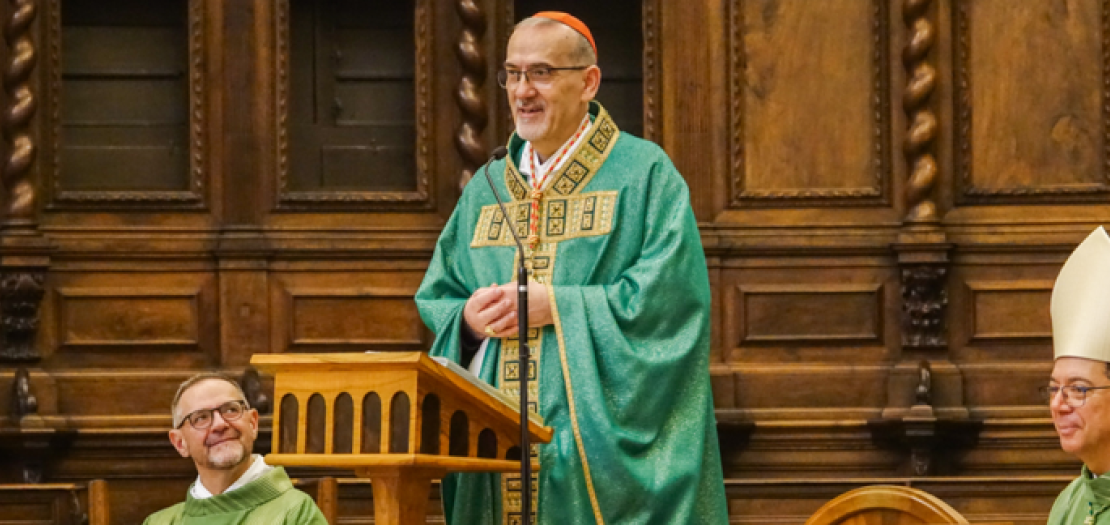
Following is the text of the homily of Cardinal Pierbattista Pizzaballa at Basilica of Saint Mary of the Angels in Assisi on July 27, 2025:
I am very happy to be here with you.
The theme we heard today in the first reading, and in the Gospel, is prayer.
It is not easy to speak about prayer: the disciples see Jesus praying, throughout the Gospel of Luke we see Jesus often immersed in prayer, and the disciples wanted to do the same (at that time there were many schools: the school of John the Baptist, the schools of the Pharisees…), and they wanted to learn from Jesus, his model of prayer—one that was distinct from all the others.
And they see something special in Jesus at that moment. Their question is an important one: “Jesus, teach us how to pray.”
Prayer is first and foremost a school; it requires a journey, preparation, work on oneself. Often, we understand prayer as simply “formulas” or something emotional. These things are useful, but prayer requires inner work, to make room. It’s not just about turning inward or digging deep within oneself—although it includes that for sure.
But prayer as Jesus presents it to us is this: allowing God to enter our home, like the friend in the Gospel.
Prayer, therefore, requires work—because we cannot touch God in the flesh like we do anyone else. So, this work must always aim to let God find a home within us. It's not easy, it requires a journey that is never complete.
Prayer is also nourishment: “Man does not live by bread alone.” In prayer, we always hear talk about bread—give us our daily bread, give us life. But man does not live by bread alone: we are also made up of questions, many questions, many concerns, deep desires.
Prayer must reach into all of this, bring light to everything that is deep within us, in the very fibers of our being, where the Lord who dwells in our home must enter, must find space to inhabit and dwell in even our most profound questions.
Prayer is not necessarily an answer to our questions.
We are creatures, He is the Creator. We have many questions that will remain unanswered. God alone knows how many questions we have in the Holy Land right now, even questions addressed to Him, which remain there waiting.
Prayer also means knowing how to wait, knowing how to remain in those situations with the right spirit. And so, prayer also nourishes the deepest fibers of our being.
Another theme present in the Gospel passage is friendship.
We do not open our hearts to strangers: we open them to someone we love, to friends whom we confide in. We are open to receive consolation from a friend. The friends here in the Gospel are two or three, a friend who goes to a friend, who in turn goes to his friend, and so on. Prayer is this; it requires friendship, desire, trust to open one's heart to someone: to God.
And then the other important aspect is to recognize that we do not have bread. If someone already knows everything, if they do not need anything, they do not go asking, they feel they have already arrived. Being hungry, on the other hand, means knowing that we have not arrived, that we do not know everything, we do not have everything. We need to ask for bread, we need to remain there, aware of our need for this Presence, which illuminates life and fills it, fills it with friendship, with love, even without solving the problems, which will remain, but gives us the opportunity to face problems with a completely different spirit.
So, recognizing that we need bread, and that we cannot produce it on our own, that it is a gift of God that we must ask for: recognizing that we are hungry and cannot satisfy that hunger by ourselves.
Then there is intercessory prayer: the friend who goes to ask for another friend, to ask for bread on his behalf. To know how to intercede, to persist: bringing others to God in prayer, not only for oneself, but praying for the other, my friend, who is also in need of, bringing all this into prayer.
Now I’ll say something that might not be easy to understand: prayer does not change the world. Prayer must change the hearts, people’s hearts.
It is people who must change the world—if their hearts have changed, if their hearts have been converted. So the purpose of prayer is to change the human heart, to allow God's presence to gradually dig deep from within us, and slowly shape our way of thinking, our way of seeing, of interpreting the situations in our personal life, family, community, and political lives, and so on.
Prayer will change the world if we men and women allow prayer to dig deep within us and give us a different perspective on life in the world, where God is present, where God intervenes.
And then there is the heart of prayer. Jesus tells us this.
The two versions of the Our Father have common points: above all, recognizing that God is Father. Father means “the one who gives life.” The Father generates, brings forth life—and therefore celebrating the father who begets life.
And who also cares for our bread—because we are not just spirit, we are also flesh, we need to eat. So, in prayer, we bring our lives, our real and vital needs. We ask not to be left alone in life’s hardships, “do not lead us into temptation”—that we may not fall into temptation.
So let us celebrate the Father who gives us life, and to celebrate forgiveness — for without forgiveness, there is no life. Without forgiveness, without the ability to forgive one another, we are not truly alive; and being regenerated continuously is a new life. I suppose I must say something about this, too: If prayer had truly entered into us, perhaps in the Holy Land we would not be living what we are living now.
I imagine I will have to say something about this as well: if prayer had truly entered our hearts, perhaps we would not be living what we are currently experiencing in the Holy Land.
If the ability to forgive one another were something real, we wouldn’t be where we are today.
And here, the Christian witness is essential: to forgive does not mean to forget, it does not mean to erase—because we cannot erase, we cannot forget—but rather not to remain stuck in the evil we have suffered. It means being able to look at what we are living through with different eyes.
And only those who have allowed themselves to be inhabited by God's presence are capable of this, because on our own, we cannot do it. But with Him, we are capable.
And every time we speak of bread, I cannot help but think of the difficult situation that much of our diocese is experiencing, where bread is a mirage.
So, asking for bread is a real, concrete prayer for many people: no one would have thought that in 2025 we would still be forced to ask for bread—right here, in a land where bread is not lacking, where there is abundance of everything.
Yet even within those situations, I want to see the good that can be found there.
In a situation where humanity seems erased, where it seems irreparably wounded—still, a careful glance can detect many gestures of true humanity: in those who, despite hunger, still manage to share the little bread they have; in those who, despite illness and lack of medicine, are able to give up the medicine they themselves need—perhaps even an important one—to someone in greater need.
Seeing children who are still capable of smiling, still capable of praying, to commit themselves, to study, to rejoice even in the simplest things…this is something. We “adults” are no longer capable of this; we have lost that innocence. But they still have it.
All of this tells us that, despite everything, humanity is not completely lost. It is our duty, the duty of pastors, of those who bear responsibility— to safeguard humanity in situations that are so profoundly inhuman.
In the First Reading, there is an important reminder: we are in a moment where it would be easy to say, “That’s enough, nothing more can be done for you.” But even among the people of Israel, there are still many righteous. And for us, those righteous ones who still live for others—we must be able to love them too, to keep our hearts open to them. Otherwise, we will end up doing exactly the same as everyone else.
And so, I conclude: we are called to bring our hunger to God, and also the hunger of others, of those who truly are literally hungry.
We need to find ourselves in Him, as men and women, as friends we can trust, and to share together the bread — that is, life.
Amen.


